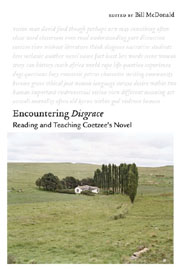Book contents
- Frontmatter
- Contents
- Acknowledgments
- Introduction
- I Reading Disgrace
- II Reading Disgrace with Others
- 11 Community Reading: Teaching Disgrace in an Alternative College Classroom
- 12 Out of the Father's House into a Community of Readers
- 13 Sympathy for the Devil: On the Perversity of Teaching Disgrace
- 14 Teaching Disgrace in the Large Lecture Classroom
- 15 Discussing Disgrace in a Critical Theory Class
- 16 Disgrace in the Classroom: A Tale of Two Teaching Strategies
- 17 The Bodies of Others: A Meditation on the Environs of Reading J. M. Coetzee's Disgrace and Caryl Phillips's The Nature of Blood
- 18 Disgrace as a Teacher
- Works Cited
- Notes on the Contributors
- Index
11 - Community Reading: Teaching Disgrace in an Alternative College Classroom
from II - Reading Disgrace with Others
Published online by Cambridge University Press: 12 September 2012
- Frontmatter
- Contents
- Acknowledgments
- Introduction
- I Reading Disgrace
- II Reading Disgrace with Others
- 11 Community Reading: Teaching Disgrace in an Alternative College Classroom
- 12 Out of the Father's House into a Community of Readers
- 13 Sympathy for the Devil: On the Perversity of Teaching Disgrace
- 14 Teaching Disgrace in the Large Lecture Classroom
- 15 Discussing Disgrace in a Critical Theory Class
- 16 Disgrace in the Classroom: A Tale of Two Teaching Strategies
- 17 The Bodies of Others: A Meditation on the Environs of Reading J. M. Coetzee's Disgrace and Caryl Phillips's The Nature of Blood
- 18 Disgrace as a Teacher
- Works Cited
- Notes on the Contributors
- Index
Summary
I think the humanities classroom is the best model of the formation of collectivities.
— Gayatri Spivak (2008)Introduction
Over its forty-year history, the Johnston Center for Integrative Studies has developed a program based on the principles of collaborative learning. These principles have their roots in the alternative college movement of the 1960s and 1970s, and also strongly resemble those found in the literature on democratic classrooms (e.g., Brookfield & Preskill 2005), socially just pedagogies (Freire 1998 and hooks 2003), and student success-centered learning (Kuh et al. 2005). Methods inspired by this history and these thinkers have been put in practice on campuses around the world, and I take the Johnston Center version to be representative of the practices instituted by committed teachers and students at those schools. I also believe that these practices can be tailored to more traditional institutions, and I write in the hope that teachers in liberal arts colleges, and even Research I institutions, will find methods here that are both useful and inspiring.
I focus on the student-centered pedagogy of the democratic literature classroom as formed by what at Johnston is called “Community Reading” or “unsolitary reading.” Community Reading motivates readers to journey self-consciously through the reading process together, regardless of class year, reading experience, or even their official role as professor or student. It begins with several simple assumptions: the unique identity of each participant, and the value of each person's intellectual inquiries, emotional responses, and personal history.
- Type
- Chapter
- Information
- Encountering 'Disgrace'Reading and Teaching Coetzee's Novel, pp. 233 - 247Publisher: Boydell & BrewerPrint publication year: 2009



